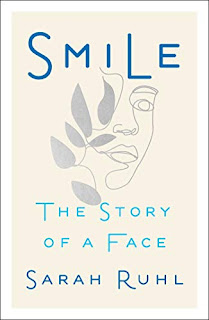I have an idiopathic condition.
That’s not the same as being a pathetic idiot, but it’s close. It refers to an
illness with an unknown origin and, often, an unknown cure, as in idiopathic
epilepsy. It can also mean an illness particular to an individual. (I’m the
only one in the whole wide world who has this—so treat me nice!)
I recently came across the word “idiopathic” in Sarah Ruhl’s memoir, Smile: The Story of a Face. It chronicles her journey with Bell’s Palsy, a condition that causes one side of the face to droop and makes a normal smile impossible. Causes and cure both unknown. Current reality, a continuing trial.
Sarah Ruhl is a relatively young
woman. We all know by now that disease does not respect age. It attacks babies
and young women, not just old crones. But we also know that one of the things
about aging is the subtle (or non-so-subtle) rebellion of body parts. Ears,
eyes, back, feet, even, sadly, the inner workings of the mind—it seems there’s
always something going wacky.
Six years ago, I noticed something
strange about my body. After a morning of work (at this time, research and
writing), I sometimes experienced a pressure in my head, like a bad head cold.
Dizziness accompanied the pressure and I felt disoriented. It was only
occasional, so I decided if I ignored it, it would go away.
It didn’t go away and the
occasions grew more frequent. When I mentioned it to my primary care giver on a
routine annual visit, she told me not to worry, that old people often feel
dizzy. I smiled on the outside, but inside I was swearing.
After a year I rebelled and
insisted the doctor do something, if only refer me to someone who might know
what was happening. She did. Over the course of the next two years, I saw an
ear-nose-and-throat guy, a neurologist, a sleep specialist, an audiologist, an
allergist, and a physical therapist; there may have been a few others. I
underwent all sorts of complicated tests that made me very grateful for a good
medical insurance plan.
At the conclusion, all the doctors
and all the tests said, “We can’t find anything wrong with you.” My primary-care-physician
told me, “I’m sorry. There’s nothing we can do for you.”
Grim doubt set in. Was I imaging
all this? Was I becoming psychosomatic? But the dizziness continued. Of
necessity, I gave up driving. I clung to my husband when walking down the hall.
I became truly pathetic. Not myself at all.
So I did the next thing. I changed
medical plans and doctors. God’s providence led me to a lovely doctor in a
large research hospital. She was the head of the headache department (I didn’t
know there was such a thing) and a specialist in dizziness. Can you imagine?
Being in the middle of the pandemic, we had our first three visits on Zoom.
Previous to our first visit she had read my case history and studied all the
tests. When we met, she told me she thought I had something called vestibular
migraines. Scary name. But—it was a diagnosis, at long last. The other
encouragement was that this doctor actually believed me. She took my symptoms
seriously. She didn’t think it was all in my head.
Except, of course, it was. The
condition is a malfunction in the vestibular system of the inner ear, the part
of the body that senses direction and speed and regulates balance. Causes and
cure are still unknown. Which means, even though it has a name, it’s still
idiopathic. No getting away from it.
Being part of a research hospital,
my doctor participates in ongoing investigation of this and other mysterious
diseases. I’ve given my permission and now I’m part of a large database as she
records the experimental medications she’s giving me, along with my reactions.
So far we haven’t come up with the best way to control the symptoms, but I’m
glad to be doing something positive. So, I have hope. Most days.
My situation is bearable,
comparatively speaking. Several friends are facing cancer, and two are living
with chronic Lyme’s disease, one a long-time friend my age and the other my
18-year-old niece. When I’m having a hard day, I try to remember that maybe I
don’t have it so bad.
Sometimes I remember that.
Sometimes I don’t.
The increasing rebellion of body
parts is one of the greatest challenges of aging. So, we do what we can—make
healthy live-style decisions, take our meds, and pray that, whatever our
condition, we have the grace not to behave like pathetic idiots.
Lord, have mercy on us all.


.JPG)



